大学英语四级考试 新版题型 较难语法点总结
2023年英语四级考试重点
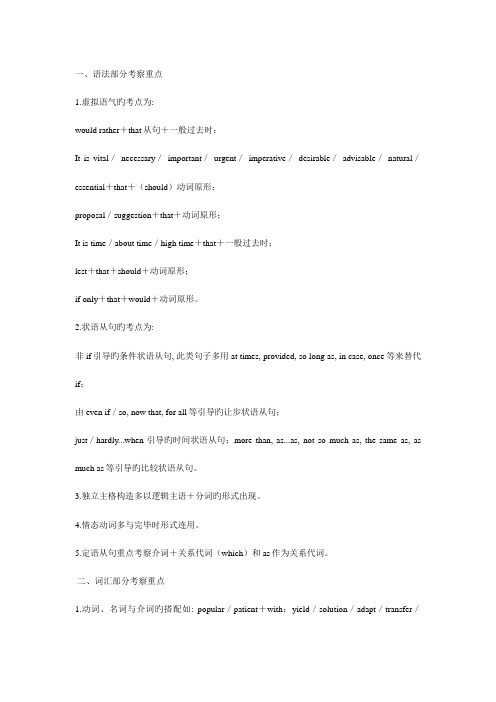
一、语法部分考察重点1.虚拟语气旳考点为:would rather+that从句+一般过去时;It is vital/necessary/important/urgent/imperative/desirable/advisable/natural/essential+that+(should)动词原形;proposal/suggestion+that+动词原形;It is time/about time/high time+that+一般过去时;lest+that+should+动词原形;if only+that+would+动词原形。
2.状语从句旳考点为:非if引导旳条件状语从句, 此类句子多用at times, provided, so long as, in case, once等来替代if;由even if/so, now that, for all等引导旳让步状语从句;just/hardly...when引导旳时间状语从句;more than, as...as, not so much as, the same as, as much as等引导旳比较状语从句。
3.独立主格构造多以逻辑主语+分词旳形式出现。
4.情态动词多与完毕时形式连用。
5.定语从句重点考察介词+关系代词(which)和as作为关系代词。
二、词汇部分考察重点1.动词、名词与介词旳搭配如: popular/patient+with;yield/solution/adapt/transfer/access+to;accuse/require+of;charge+for;under+discussion等等。
2.习常使用方法如:confess to/set about/be used to+doing;be supposed to/have/make sb. +do等。
3、由同一动词构成旳短语如: come, go, set, break等构成旳短语。
英语四级考试语法难点解析语法难点解析掌握语法知识点
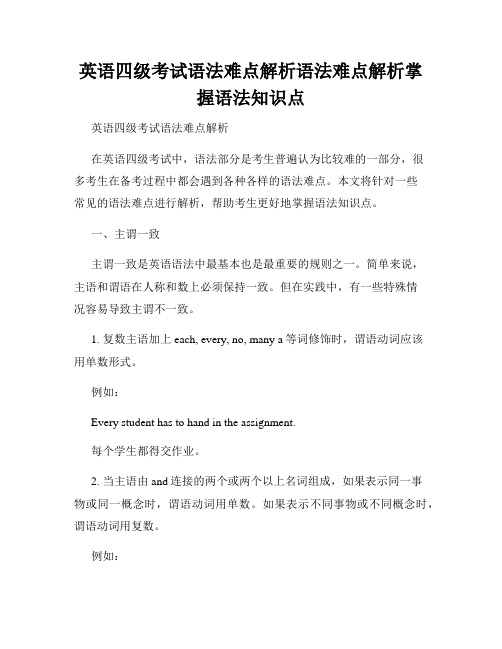
英语四级考试语法难点解析语法难点解析掌握语法知识点英语四级考试语法难点解析在英语四级考试中,语法部分是考生普遍认为比较难的一部分,很多考生在备考过程中都会遇到各种各样的语法难点。
本文将针对一些常见的语法难点进行解析,帮助考生更好地掌握语法知识点。
一、主谓一致主谓一致是英语语法中最基本也是最重要的规则之一。
简单来说,主语和谓语在人称和数上必须保持一致。
但在实践中,有一些特殊情况容易导致主谓不一致。
1. 复数主语加上each, every, no, many a等词修饰时,谓语动词应该用单数形式。
例如:Every student has to hand in the assignment.每个学生都得交作业。
2. 当主语由and连接的两个或两个以上名词组成,如果表示同一事物或同一概念时,谓语动词用单数。
如果表示不同事物或不同概念时,谓语动词用复数。
例如:Bread and butter is my favorite breakfast.(表示作为一种食物的概念)面包和黄油是我最喜欢的早餐。
John and Mary are my best friends.(表示两个不同的人)约翰和玛丽是我最好的朋友。
二、冠词的使用冠词在英语语法中也是一个比较常见的难点。
冠词分为定冠词和不定冠词。
定冠词the通常用于特指某个人或物,而不定冠词a/an用于泛指一个人或物。
以下是冠词使用的一些难点:1. 对于形容词最高级前的名词,如果该名词是可数名词的单数形式,前面要加上定冠词the;如果该名词是可数名词的复数形式或者不可数名词,前面不加冠词the。
例如:He is the tallest boy in the class.他是班上最高的男孩。
She is the most beautiful girl in the city.她是城里最美丽的女孩。
2. 在表示职业、宗教、国籍等名词前,可以用不定冠词a或an表泛指,也可以用定冠词the表特指。
大学英语四级考试 新版题型 较难语法点总结
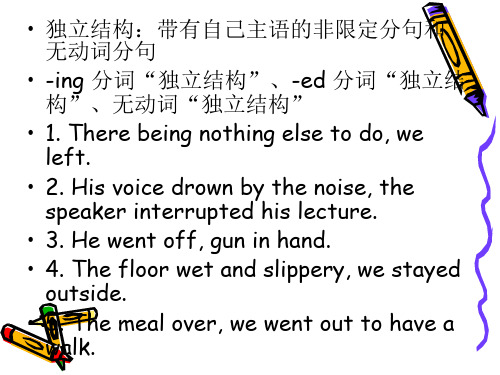
• 3. in the way in which • Do as I say and sit down.
• 4. although Young as I am, I already know what career I want to follow.
Fast as you read, you cannot finish the book in two days.
• I wish it was spring al the year round.
• I’d rather I was not at the site of the accident. • • Suppose the earth was flat.
倒装
• 1句首为否定词或带有否定意义的词语时, 局部倒装 • Never have I found him in such a good mood. • At no time during his speech did the politician mention his policy. • Hardly had he finished his work, when the telephone rang.
“it” as the formal subject
• Adv. • as…as (prep.) • 1. The dress is twice as expensive as that one. • 2. He doesn’t play half as well as his sister.
“as”
• This kind of film is twice thinner than ordinary paper, but its quality is quite good.
四级英语考试语法要点总结
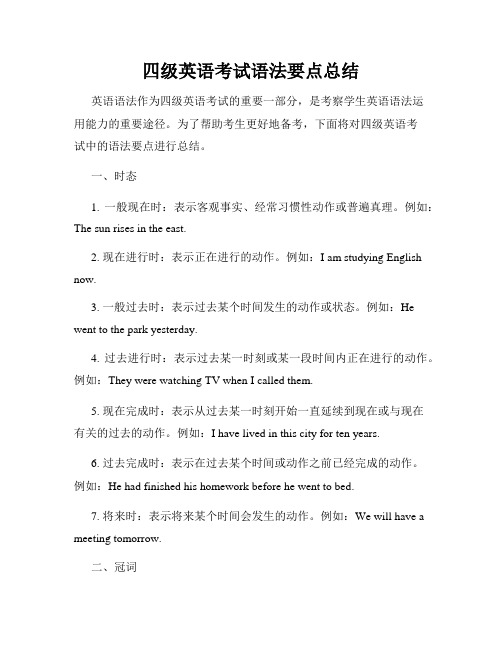
四级英语考试语法要点总结英语语法作为四级英语考试的重要一部分,是考察学生英语语法运用能力的重要途径。
为了帮助考生更好地备考,下面将对四级英语考试中的语法要点进行总结。
一、时态1. 一般现在时:表示客观事实、经常习惯性动作或普遍真理。
例如:The sun rises in the east.2. 现在进行时:表示正在进行的动作。
例如:I am studying English now.3. 一般过去时:表示过去某个时间发生的动作或状态。
例如:He went to the park yesterday.4. 过去进行时:表示过去某一时刻或某一段时间内正在进行的动作。
例如:They were watching TV when I called them.5. 现在完成时:表示从过去某一时刻开始一直延续到现在或与现在有关的过去的动作。
例如:I have lived in this city for ten years.6. 过去完成时:表示在过去某个时间或动作之前已经完成的动作。
例如:He had finished his homework before he went to bed.7. 将来时:表示将来某个时间会发生的动作。
例如:We will have a meeting tomorrow.二、冠词1. 不定冠词a/an:表示泛指单数可数名词。
例如:I saw a cat in the park.2. 定冠词the:表示特指或泛指某一类事物。
例如:The sun is shining.3. 零冠词:表示泛指复数名词、抽象名词和专有名词。
例如:Apples are sweet.三、代词1. 主格人称代词:I, you, he, she, it, we, they。
例如:You should study hard.2. 宾格人称代词:me, you, him, her, it, us, them。
例如:John gave me a present.3. 物主代词:my/mine, your/yours, his, her/hers, its, our/ours,their/theirs。
四级语法考点总结
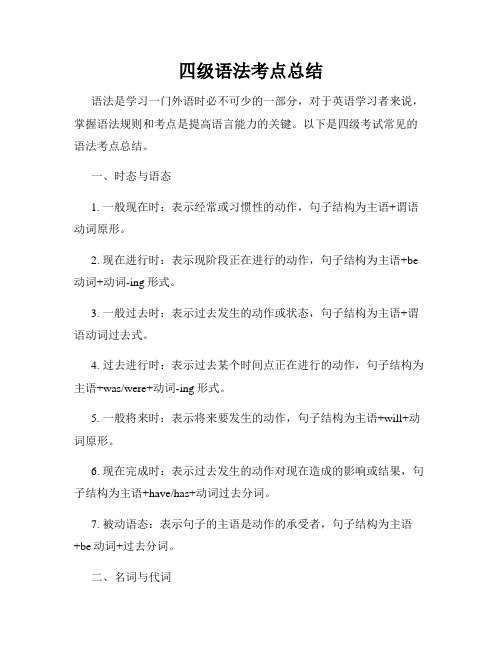
四级语法考点总结语法是学习一门外语时必不可少的一部分,对于英语学习者来说,掌握语法规则和考点是提高语言能力的关键。
以下是四级考试常见的语法考点总结。
一、时态与语态1. 一般现在时:表示经常或习惯性的动作,句子结构为主语+谓语动词原形。
2. 现在进行时:表示现阶段正在进行的动作,句子结构为主语+be 动词+动词-ing形式。
3. 一般过去时:表示过去发生的动作或状态,句子结构为主语+谓语动词过去式。
4. 过去进行时:表示过去某个时间点正在进行的动作,句子结构为主语+was/were+动词-ing形式。
5. 一般将来时:表示将来要发生的动作,句子结构为主语+will+动词原形。
6. 现在完成时:表示过去发生的动作对现在造成的影响或结果,句子结构为主语+have/has+动词过去分词。
7. 被动语态:表示句子的主语是动作的承受者,句子结构为主语+be动词+过去分词。
二、名词与代词1. 可数名词与不可数名词:可数名词表示可以数的事物,可以与冠词或数词连用;不可数名词表示不能数的物质或抽象概念,不能与冠词连用。
2. 可数名词的单复数形式:大部分名词在尾部加-s或-es构成复数形式,但也有很多名词有不规则的复数形式。
3. 代词的使用:代词用于代替名词,可以避免重复使用,例如人称代词、指示代词、不定代词等。
4. 反身代词:反身代词用于强调动作的主体同时也是动作的承受者,例如myself、yourself等。
三、形容词与副词1. 形容词的比较级与最高级:形容词比较级用于比较两个事物的性质,最高级用于比较三个或以上事物的性质。
2. 副词的用法:副词用于修饰动词、形容词或其他副词,例如slowly、very等。
四、介词与连词1. 常用介词的使用:介词用于表示时间、地点、原因、方式等,例如at、in、on等。
2. 连词的使用:连词用于连接短语、从句或并列句,例如and、but 等。
五、从句与句型1. 名词性从句:名词性从句用于替代名词的作用,包括主语从句、宾语从句、表语从句和同位语从句。
英语四级考试中的语法难点和易错题解析

英语四级考试中的语法难点和易错题解析英语四级考试中,语法是考生们普遍认为比较困难的一个部分。
本文将针对英语四级考试中的语法难点和易错题进行解析,帮助考生们更好地备考和应对考试。
一、主谓一致的难点和易错题解析主谓一致是英语语法中的一个重要规则,但也是考生们易错的一个点。
主谓一致指的是主语和谓语在人称和数上要相互一致。
在这个问题上,考生需要注意以下几个难点:1. 复合主语和复数谓语的一致当句子的主语是由两个或更多的名词或代词连接而成的复合主语时,在谓语动词的一致性上容易出错。
例句:- My brother and sister (is/are) studying in the same university.正确答案是:My brother and sister are studying in the same university. 因为主语是由两个名词连接而成的复合主语,所以谓语动词应该用复数形式。
2. 具有“each, every, either, neither”等词的主语具有“each, every, either, neither”等词的主语在形式上是单数,所以其后的谓语动词也要用单数形式。
例句:- Every student in the class (has/have) passed the exam.正确答案是:Every student in the class has passed the exam.3. 不定代词的一致性不定代词(如someone, anybody, nobody)作为主语时,其后的谓语动词形式要根据不定代词所表示的人称和数的意义来确定。
例句:- Nobody (was/were) at home when I arrived.正确答案是:Nobody was at home when I arrived.二、时态和语态的难点和易错题解析时态和语态在英语四级考试中也是容易出错的难点。
四级真题语法重难点解析
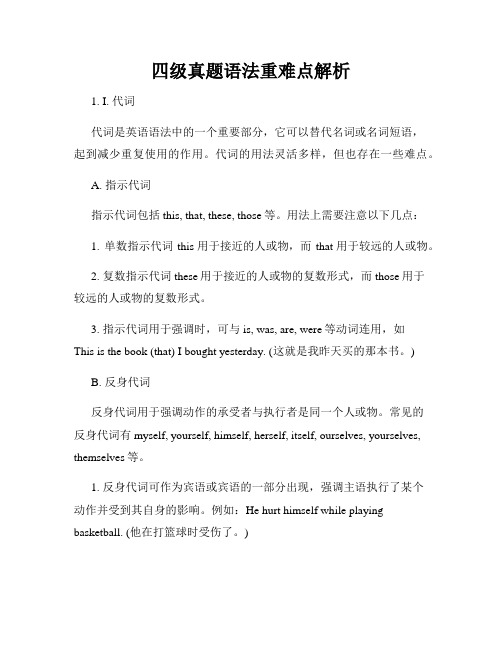
四级真题语法重难点解析1. I. 代词代词是英语语法中的一个重要部分,它可以替代名词或名词短语,起到减少重复使用的作用。
代词的用法灵活多样,但也存在一些难点。
A. 指示代词指示代词包括this, that, these, those等。
用法上需要注意以下几点:1. 单数指示代词this用于接近的人或物,而that用于较远的人或物。
2. 复数指示代词these用于接近的人或物的复数形式,而those用于较远的人或物的复数形式。
3. 指示代词用于强调时,可与is, was, are, were等动词连用,如This is the book (that) I bought yesterday. (这就是我昨天买的那本书。
)B. 反身代词反身代词用于强调动作的承受者与执行者是同一个人或物。
常见的反身代词有myself, yourself, himself, herself, itself, ourselves, yourselves, themselves等。
1. 反身代词可作为宾语或宾语的一部分出现,强调主语执行了某个动作并受到其自身的影响。
例如:He hurt himself while playing basketball. (他在打篮球时受伤了。
)2. 反身代词也可以用作主语的补语,强调主语对自身有某种感觉或状态。
例如:I find myself lost in the city. (我发现自己迷路了。
)C. 不定代词不定代词表示不确定的人或物,常见的不定代词有somebody, anybody, nobody, everybody, something, anything, nothing, everything等。
1. 不定代词可在句子中作主语、宾语、定语、状语等成分。
例如:Somebody called you while you were out. (你外出时有人给你打电话。
)2. 不定代词与动词连用时,动词形式需根据不定代词的单复数和人称进行变化。
四级语法考点中哪些最容易出错

四级语法考点中哪些最容易出错在大学英语四级考试中,语法是一个重要的考查部分。
对于许多考生来说,掌握语法并非易事,其中有一些考点尤其容易出错。
接下来,我们就一起来探讨一下四级语法考点中那些容易让人“栽跟头”的地方。
首先,虚拟语气可以说是让众多考生头疼的一个考点。
虚拟语气用于表示与事实相反或假设的情况。
比如,在“if”引导的条件状语从句中,如果表示与现在事实相反,从句要用一般过去时,主句要用“would/could/should/might +动词原形”。
很多同学在判断时态和动词形式时容易出错,例如“If I were you, I would take this job”这里就需要用“were”而不是“was”,因为在虚拟语气中,“be”动词要用“were”。
时态的运用也是容易出错的“重灾区”。
一般现在时、一般过去时、现在进行时、过去进行时、现在完成时、过去完成时等,各种时态的构成和用法都有特定的规则。
比如现在完成时表示过去发生的动作对现在造成的影响或结果,其构成是“have/has +过去分词”。
但有些同学会把它和过去完成时混淆,过去完成时则表示过去某一时间或动作之前已经发生或完成了的动作,其构成是“had +过去分词”。
在具体的语境中,选择正确的时态对于准确表达意思至关重要,而这也是很多同学容易失误的地方。
非谓语动词也是四级语法中的难点。
非谓语动词包括不定式、动名词和分词(现在分词和过去分词)。
例如,“I enjoy reading books”这里用动名词“reading”作宾语;“To pass the exam, he studies hard”这里用不定式“To pass”作目的状语。
在句子中判断何时使用哪种非谓语动词形式,需要对句子结构和语义有清晰的理解。
很多同学在这方面容易混淆,导致语法错误。
主谓一致的问题也常常困扰着考生。
当主语是单数时,谓语动词要用单数形式;当主语是复数时,谓语动词要用复数形式。
- 1、下载文档前请自行甄别文档内容的完整性,平台不提供额外的编辑、内容补充、找答案等附加服务。
- 2、"仅部分预览"的文档,不可在线预览部分如存在完整性等问题,可反馈申请退款(可完整预览的文档不适用该条件!)。
- 3、如文档侵犯您的权益,请联系客服反馈,我们会尽快为您处理(人工客服工作时间:9:00-18:30)。
“it” as the formal subject
• Adv. • as…as (prep.) • 1. The dress is twice as expensive as that one. • 2. He doesn’t play half as well as his sister.
“as”
比较句
• 3 the more…the more • The older I get, the happier I am.
• The sooner you start, the more quickly you’ll finish. • The more you argue with him, the less notice he takes.
• I wish it was spring al the year round.
• I’d rather I was not at the site of the accident. • • Suppose the earth was flat.
倒装
• 1句首为否定词或带有否定意义的词语时, 局部倒装 • Never have I found him in such a good mood. • At no time during his speech did the politician mention his policy. • Hardly had he finished his work, when the telephone rang.
• 3. in the way in which • Do as I say and sit down.
• 4. although Young as I am, I already know what career I want to follow.
Fast as you read, you cannot finish the book in two days.
• 1. They cannot choose but admit that they are wrong.
双重否定
• 2. There is no rule but has its exceptions.
正反判断句
• 1. What I admire in Columbus is
not his having discovered a world, but his having gone to search for it on the faith of an opinion.
• 独立结构:带有自己主语的非限定分句和 无动词分句 • -ing 分词“独立结构”、-ed 分词“独立结 构”、无动词“独立结构” • 1. There being nothing else to do, we left. • 2. His voice drown by the noise, the speaker interrupted his lecture. • 3. He went off, gun in hand. • 4. The floor wet and slippery, we stayed outside. • 5. The meal over, we went out to have a walk.
• 1. 表原因 • The last bus having gone, we had to walk home. • 2. 表条件 • Weather permitting, the match will be played on Sunday. • 3. 表示方式和伴随状况 • She was sitting at her desk, her head slightly lowered over a pile of documents. • Without anyone noticing, I slipped through the window.
• Conj. • 1. when; while • As he grew older, he lost interest in everything except gardening. • 2. since; because • As you weren’t there, I left a message.
• This kind of film is twice thinner than ordinary paper, but its quality is quite good.
• The cost of the new product is 25% as much as that of the old one. • The price of mobile phones reduced by 50%.
同位语
• 1. more…than • The living room is larger than the diningroom. • John is more daring than quick-witted. • George is more intelligent than aggressive. • The present crisis is much more a political than an economic crisis. • 2. no more/ -er than • John is no better than Tom. • A whale is no more a fish than a horse is.
• 虚拟语气 • 1 用于表示命令、决定、建议等词语之后的 that- 分句中 • He ordered that all the books be sent at once. • She insisted that she go to the south for her holiday. • 2 用在 decision, demand, order, requirement 等名词之后的 that- 分句中 • Their decision was that the school remain closed.
• as…as (conj.) • 1. His eyes aren’t as blue as they look in the film. • 2. Run as fast as you can. • 3. He recited as much of the poem as he could remember.
Try as he might, he couldn’t open the door.
• as for sb/sth • As for the hotel, it was very comfortable and near the sea. • As for you, you should be ashamed of yourself. • as to sth; as regards sth • As to correcting our homework, our teacher often makes us do it ourselves.
• Not only did he complain about the food,
• 后置修饰语 • the students outside the classroom • the students standing outside the classroom • The castle, burnt in the 17th century, was never rebuilt. • the students who were standing outside the classroom • a student clever enough to answer the challenging question
修饰语
ቤተ መጻሕፍቲ ባይዱ
Winston Churchill, Britain's prime minister during the Second World War, died in 1965.
Playing football, his only interest in life, has brought him many friends.
• 2. Not that we are afraid of them, but that they are afraid of us.
• 1. It is necessary that we get everything well prepared. • 2. It turns out that the price begin to go down. • 3. It stands to reason that all the weak will be against them. • 4. It was the case that everything was in a mess.
• The output of cars this year is three times as great as that of last year. • The output of cars this year is two times greater than that of last year. • The output of cars this year has increased two times as compared with that of last year. • The sales of computers have multiplied six times since 1988.
• He would have been there by now if he had not missed the train.
• If it was to rain, the game would be put off.
